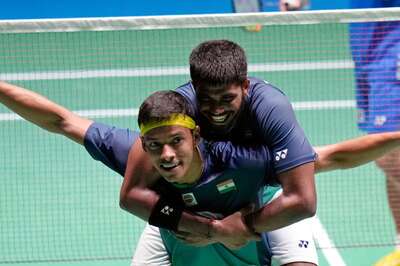
views
When you remark that poetry festivals are usually gatherings of the grand old or graying bards and she looks rather young to qualify, Raquel Lanseros says she is not new to that comment. “I am always told that when I go to festivals. Well, I like reading to young people too because I believe that the taste for poetry should be cultivated at very young ages.”The Spanish poet is in the city to take part in the on-going Kritya International Poetry Festival 2012. At the readings inside the serene environs of the koothambalam at Vyloppilli Samskrithi Bhavan, the musical ease of Raquel’s verse resounds with a gentle melancholy.The poet, who has degrees in English and French philology, left her job as a University teacher to volunteer for a cultural foundation based in Madrid. “The organisation is called ‘The Elephant in a Black Box’ and we work on a range of avenues like cinema, literature and sculpture,” she offers enthusiastically.Charming as she is, Raquel says that to her, poetry is not essentially about beautiful things. “I think the element of time is a very influential factor in my writings. I am affected by the thought of how short human life is. And poetry is very close to philosophy in its engagement with such aspects,” she says.The effortless melody of her poetry comes partly from the musical quality of her mother tongue, says raquel. “People who speak other languages often refer to the songful quality of Spanish and it strikes a chord with readers. Yes, I would rather stick the classical style of rhyme and meter and most of my poems are rhyming too. But, its not deliberate and I write free verse also. Only, the lines will have music inside them and there will be a kind of melody in my poetry,” says raquel who plays the Spanish guitar.Her unhurried, soft manner of talking, the large, expressive eyes conveying as much as the words, would not prepare you for the swell of emotion at the mention of Spain’s civil war. “In time, it is quite distant, because my mother was born after the civil war. But the generation of my grandparents had lived through the strife. The agony of the experience is still close to our hearts and it still hurts,” she pauses. “It has not yet been long enough for healing and Spain has wounds that still hurt,” she adds, her voice scratchy from the torrent of emotions.A short silence later, Raqeul says that she often writes about her ancestors. “It is a homage to my people, my grandparents and their generation who were direct witnesses to the conflict. I believe I have a moral obligation to tell the world of what happened in our country.”Raquel writes in one of her poems titled, ‘A Young Poet Remembers his Father’ - Now I know that I passed through your life/indolent and unsuspecting, without wonder,/just as all men tend to live who do not yet know loss.However, she clarifies that her countrymen no longer think of Spain as an erstwhile coloniser as the last vestiges of imperialism was lost long back. “Cuba was the last colony to declare independence from Spain and that was in 1898. I don’t think we have memories of colonialism for generations now. In fact, people of my generation think of Spain as a loser because we have had a history of peaceful existence for only as long the last fifty years,” she says.“In fact, I have found that in former colonies, there is a common culture that I can easily identify with. The major market for Spanish writings is the South American countries and I travel to those places very often for poetry readings. There is a very strong cultural affinity with Spain in these countries and one feels quite at home. I don’t think the people in these countries harbour any animosity towards Spain any longer,” she says.Her maiden visit to God’s Own Country has left the young poet impressed. “It reminds me of Cuba. I had been to some parts of North India on a visit three years back. But, I’ve always wanted to come to the South because I have been told that the real India is down in the South,” she smiles.


















Comments
0 comment